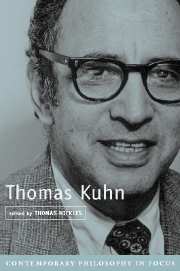Book contents
- Frontmatter
- Contents
- Contributors
- Preface
- Introduction
- 1 Kuhn and Logical Empiricism
- 2 Thomas Kuhn and French Philosophy of Science
- 3 Normal Science and Dogmatism, Paradigms and Progress: Kuhn ‘versus’ Popper and Lakatos
- 4 Kuhn's Philosophy of Scientific Practice
- 5 Thomas Kuhn and the Problem of Social Order in Science
- 6 Normal Science: From Logic to Case-Based and Model-Based Reasoning
- 7 Kuhn, Conceptual Change, and Cognitive Science
- 8 Kuhn on Concepts and Categorization
- 9 Kuhn's World Changes
- 10 Does The Structure of Scientific Revolutions Permit a Feminist Revolution in Science?
- Selected References in English
- Index
10 - Does The Structure of Scientific Revolutions Permit a Feminist Revolution in Science?
Published online by Cambridge University Press: 07 December 2009
- Frontmatter
- Contents
- Contributors
- Preface
- Introduction
- 1 Kuhn and Logical Empiricism
- 2 Thomas Kuhn and French Philosophy of Science
- 3 Normal Science and Dogmatism, Paradigms and Progress: Kuhn ‘versus’ Popper and Lakatos
- 4 Kuhn's Philosophy of Scientific Practice
- 5 Thomas Kuhn and the Problem of Social Order in Science
- 6 Normal Science: From Logic to Case-Based and Model-Based Reasoning
- 7 Kuhn, Conceptual Change, and Cognitive Science
- 8 Kuhn on Concepts and Categorization
- 9 Kuhn's World Changes
- 10 Does The Structure of Scientific Revolutions Permit a Feminist Revolution in Science?
- Selected References in English
- Index
Summary
Kuhn's influence on feminist science studies and feminist theory of knowledge might well be understood as an example of the principle of unintended consequences. Kuhn's notions of theory-laden meaning and observation and of revolutionary science were embraced by feminist thinkers, who applied them in ways that seem their natural and logical extensions. Judging from remarks in later essays such as “The Trouble with the Historical Philosophy of Science,” Kuhn would have had serious reservations about these applications, as he had about many of those in science studies who took his views as a mandate to inquire into the social nature of scientific inquiry. Nevertheless, the power of his challenge to logical empiricist philosophy of science provided a philosophical basis for a wide range of critical approaches to the sciences.
When The Structure of Scientific Revolutions burst upon the academic scene in the early 1960s, the second wave of feminism was in its earliest stages: identifying the forms of legal discrimination against women, challenging the cultural expectations of femininity, agitating for access to contraception and abortion, and rebelling against the second-class status accorded to women in the civil rights and antiwar movements. By the early 1970s, feminists in the academy had expanded the reach of feminism to analysis and critique of the research and scholarship that supported the discriminatory legal and social treatment of women. They argued that the traditional academic disciplines were guilty not only of professional discrimination in university admissions, hiring, and promotion, but also of scholarly discrimination.
- Type
- Chapter
- Information
- Thomas Kuhn , pp. 261 - 281Publisher: Cambridge University PressPrint publication year: 2002
- 3
- Cited by

